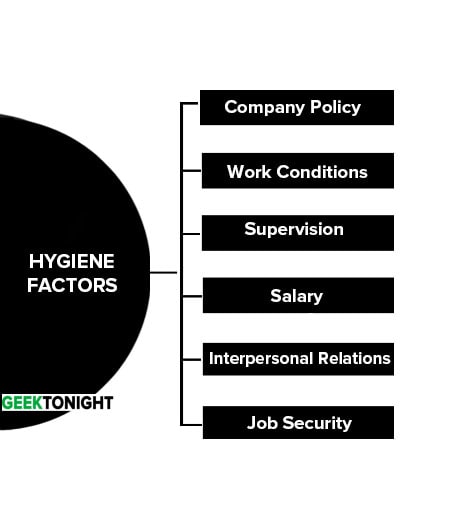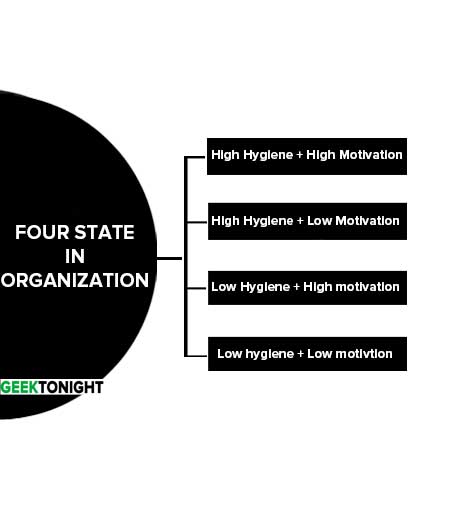Herzberg Two Factor Theory is also known as the Herzberg’s motivation-hygiene theory and dual-factor theory was coined by Frederick Herzberg in 1959.
Table of Content
What is the Two Factor Theory?
Herzberg Two Factor Theory or Herzberg’s Motivation-Hygiene Theory, argues that there are two factors that influence the motivation of the employee in the organization.
In 1959, Herzberg conducted a study on 200 engineers and accountants from over nine companies in the United States.
He asked professionals to describe two important incidents at their job. when did they felt either extremely bad or exceptionally good about their jobs and rated their feelings on these experiences.
Responses about satisfied feelings are generally related to “job content” (motivation factors/ satisfiers ) and responses about dissatisfied feelings are associated with “job context” (hygiene factor/ dissatisfiers). This is why it is known as Two Factor Theory.
Read: What is Organizational Behavior?
Motivation factors
Motivation factors, which are the drivers of human behavior related to the intrinsic nature of the work.
There are six motivation factors that include:

Achievement
Achievement factor refers to successful performance of individual’s work tasks, solving problems, justification and seeing the results of one’s work.
Recognition
Recognition depends on praise, notice and criticism received from colleagues or management and it mainly means getting recognition due to achievement in tasks.
Work itself
Work itself describes the actual content of one’s job, basically meaning the tasks of the job.
Responsibility
Responsibility means the sense of responsibility given to an employee for his/her own work or being given new responsibilities.
Advancement
Advancement refers to a change in one’s position at work and, therefore, involves the concept of promotion.
Possibility of Growth
JOb must give equal and adequate opportunities for the employee to learn new skills and to achieve career advancement.
Hygiene Factors
Hygiene factors, which are contingent factors may demotivate the employee.
These are hygiene factors which includes:
- Company Policy
- Work Conditions
- Supervision
- Salary
- Interpersonal Relations
- Job Security

Company policy
Company policy and administration relate specifically to organization management at workplaces and they also require personnel policies.
Work conditions
Working conditions require the physical environment of working and especially the available facilities with all their space and tools, for instance.
Supervision
Supervision, refers to the actual behavior of managers towards employees, for example, how fair or unfair they are and how willing they are to envoy responsibilities.
Salary
Salary is an economic benefit for work.
Interpersonal Relations
It refer to the social interactions between colleagues and between workers and their supervisors.
Job Security
The employee must have a sense of belongingness and feel secure. They must not work under the stress that their job can be laid off anytime.
Four State in Organization
Four different combinations can exist at an organization:

High Hygiene + High Motivation
Employees are highly motivated and have few complaints.
High Hygiene + Low Motivation
Employees is not highly motivated and have few complaints.
Low Hygiene + High motivation
Employees are motivated but have a lot of complaints.
Low hygiene + Low motivation
Employees is not motivated and also have a lot of complaints
Two factor theory or Herzberg’s Motivation-Hygiene theory sought that manager should consider all the two factors in order to optimally motivate and satisfy employees to get the best out of them rather than to be one-sided in considering factors to motivate employees
Read: Motivation Theories
How Manager can use Two Factor Theory?
Every organization and manager wants the team to give their best possible performance. But How do you motivate employees? Motivating people really works when eliminating the things that bother them.
Eliminate job dissatisfaction
According to Herzberg (1987) managers can eliminate the dissatisfaction among the employee by applying the motivation factors of two factor theory as follow:
- Fix poor and obstructive company policies.
- Provide effective, supportive and non-intrusive supervision.
- Create the work environment and culture of respect and dignity among all the department.
- Provide competitive wages and salaries and job security.
- Providing meaningful work for all positions and build job status.
Create job satisfaction
According to Herzberg (1987), job enrichment is the motivating factors that are needed to be addressed. He suggested that every job should be examined to determine how it could be made better and more satisfying to the person doing it.
Hence, managers need to consider and include:
- Providing equal and adequate opportunities for achievement and growth.
- Recognizing employee contributions.
- Assigning work that matches the skills and abilities of the employee and is rewarding.
- Assigning equal responsibility among each team member as possible.
- Providing opportunities for internal promotions.
- Offering training and development opportunities so that employee can pursue the growth in his career.
Read: What is Attitude?
Critique of Two Factor Theory
Although, Two Factor Theory has a few issues with it but still it is widely used.
First, when things are going well employees tend to look at the aspects of their work that they like and project them onto themselves. But, dring bad times, external factor play a big role.
Another, critique of Two Factor Theory is that Herzberg didn’t take account that external factors might influence productivity. He only consider job satisfaction results in higher productivity.
Finally, it is only applies to white-collar employees.
Read: Theories of Personality
Summary of Two Factor Theory
Two Factor Theory is one of the content motivation theories. Herzberg in Two Factor Theory or Herzberg’s Motivation-Hygiene Theory states that two factors affect motivation in the workplace.
These two factor are hygiene factors and motivating factors.
- Workers motivated to work harder by motivators e.g. more responsibility and appreciation etc..
- Workers can become de-motivated if hygiene factors are not met e.g. salary and work conditions.
To successfully implement two factor theory, first hygiene factor should be resolved. once those are resolved, then motivators factor should be implemented to enhance motivation.
Read: What is Learning?
Reference
- Robbins, Stephen P. 2010. Organizational Behaviour. New Delhi: Prentice-Hall.
Management Topics
- What is Management?
- Who Is a Manager?
- Marketing CIs Management an Art or Science
- Classical Management Approach
- Planning in Management
- Decision Making in Management
- Organising in Management
- What is Organisation Structure?
- What is Departmentation?
- What is Span of Control?
- What is Authority?
- What is Staffing?
- What is Human Resource Planning?
- What is Job Analysis?
- What is Recruitment?
- Modern and Others Schools of Management Thought
- What is Selection?
- What is Coordination?
- What is Controlling?
- What is Leadership?
- What is Organisational Change?
- Motivation in Management
- Motivation Theories
- Maslow’s Hierarchy of Needs
- Herzberg Two Factor Theory
- Mcclelland’s Needs Theory of Motivation
Go On, Share & Help your Friend
Did we miss something in Organizational Behavior Tutorial or You want something More? Come on! Tell us what you think about our post on Herzberg Two Factor Theory | Organisational Behavior in the comments section and Share this post with your friends.
Human Resources Tutorial
(Click on Topic to Read)







